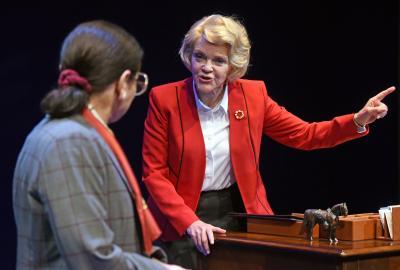Jonathan Shapiro’s Sisters In Law (based on the cleverly titled 2015 book by Linda Hirshman) is about the U.S. Supreme Court’s first two female justices and their relationship on and off the bench. In an irony of history rightwinger Ronald Reagan appointed the first woman to sit on the high court. Stephanie Faracy portrays Sandra Day O’Connor like the screen version of Doris Day wearing robes. The Arizonan comes across as a not too bright all American gal and goody two shoes, who really doesn’t stand up for what is right.
On the other hand, Clinton Supreme Court appointee Ruth Bader Ginsburg (Tovah Feldshuh) is a feisty East Coast Jew with a lifelong devotion to equal rights for women. If O’Connor is one of those people who go along to get along (for instance, according to the play she waffled on abortion rights), Ginsburg is cut more in the crusader mold and perceived as being “pushy.” (Which, as she correctly points out, is code for an anti-Semitic trope - calling Jews “pushy” is like labeling Blacks “uppity”).
However, as this West Coast premiere shows, they share things in common. Both are women in a patriarchal “man’s world,” and they are, as said, the first of their gender to have a prestigious perch on the highest court in the land. Although they have different interpretations of the law and Constitution, what Sandra and Ruth share in common is more important and powerful than where the Arizonan and East Coaster differ.
The Emmy Award winning Shapiro has a strong TV background, and the credits of this Rhodes Scholar, who earned degrees at Harvard, Oxford and Berkeley Law School, include Boston Legal. Much of his one-act play moves with a motion picture panache. Scenic designer Rachel Myers’ set is fluid and filmic. Scenes shift swiftly and projections (by Yee Eun Nam) emblazon the wall of the Lovelace Studio Theater with collage-like headlines ripped from newspapers and imagery, with enlarged photos of figures as diverse and emblematic as Black Panther Kathleen Cleaver and opera singer Luciano Pavarotti, accompanied by often period music to help set the time.
Unfortunately, this cinematic style clashes with the play’s two extended sequences, which unlike the other shorter, montage-like vignettes, seems stagey and theatrical in comparison. So the form of this 90-ish minute play performed sans intermission is at times uneven.
Appropriately, two heavy hitters do the heavy lifting portraying these courthouse trailblazers. Between them, Feldshuh and Faracy have racked up more credits than Ginsburg and O’Connor filed legal briefs or heard cases. Feldshuh has also received more nominations and awards than cases Ginsburg or O’Connor ever won. Interestingly, Feldshuh has depicted some high ranking, powerful women, including the U.S. president in the TV sci fi series Salvation; on Broadway and onscreen Feldshuh played Israeli Prime Minister Golda Meir in Golda’s Balcony; and Manhattan’s Queen of Mean, real estate hellcat Leona Helmsley.
Faracy’s big and little screen credits stretch from Warren Beatty’s 1978 Heaven Can Wait to 2004’s Sideways to HBO’s 2010 Temple Grandin to 2016’s Mike and Dave Need Wedding Dates. Both leads are ably helmed by director Patricia McGregor.
The “Notorious RBG” has become a liberal icon, if not a folk hero, portrayed in feature and documentary films, and Shapiro’s play adds to this lore. The thought of the aging justice leaving the bench while Trump - who has appointed a record number of reactionaries to preside over Federal courts - is hair-raising. Coming as it does when Trump seeks to flout the law willy-nilly, Sisters In Law also reminds us of the importance of the rule of law, and that nobody is above the law. Across the Atlantic, the U.K.’s Supreme Court similarly reasserted that democracies are intended to have governments of law - not of men - by overruling Prime Minister Boris Johnson’s despotic desperate attempt to shutdown the British Parliament.
Hear ye, hear ye: This critic’s verdict is that Sisters In Law is found “guilty” of being worthwhile for plaintiffs and theatergoers interested in feminist subject matter, such as Ibsen’s A Doll’s House, and in legal affairs, like 12 Angry Men. But ticket buyers should be aware that this play’s run ends in about two weeks, so if you want to see it you better hurry up, because justice delayed is justice denied.
Sisters In Law is being performed through October 13 in the Lovelace Studio Theater, Wallis Annenberg Center for the Performing Arts, 9390 N. Santa Monica Blvd., Beverly Hills, CA 90210. For info: (310)746-4000; www.thewallis.org/Sisters .
L.A.-based reviewer/film historian Ed Rampell co-authored “The Hawaii Movie and Television Book” available at: https://mutualpublishing.com/product/the-hawaii-movie-and-television-book/. Rampell is moderating the “Enter Stage Left: Theater, Film and TV for a Better World” panel at the Left Coast Forum (see: https://leftcoastforum.org/enter-stage-left/).



